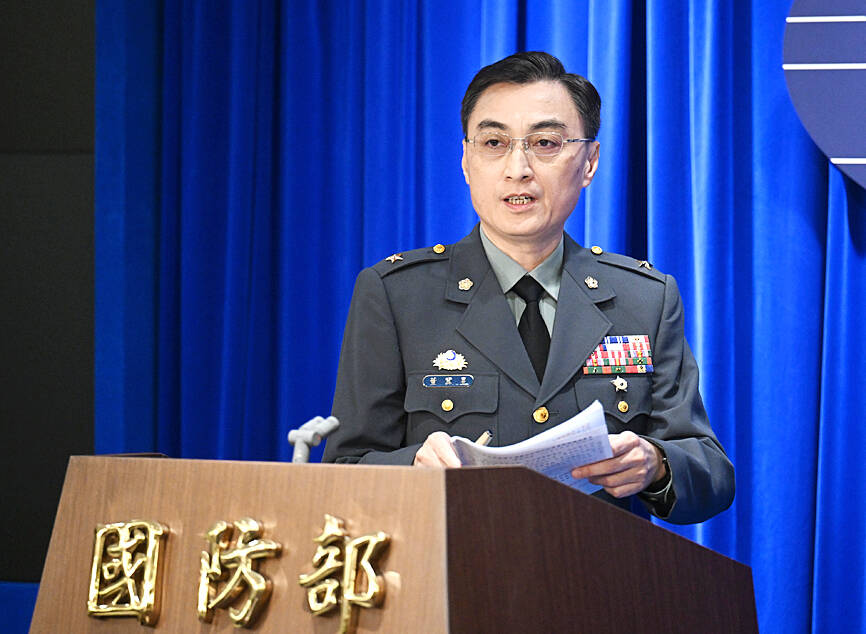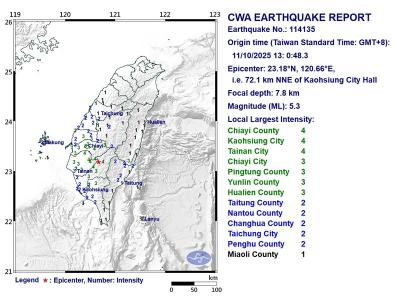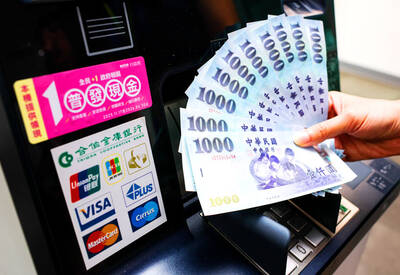Taiwan’s annual war games this year are to practice “kill” zones at sea to break a blockade and simulate a scenario where China suddenly turns one of its regular drills around the nation into an actual attack, the Ministry of National Defense said yesterday.
The nation is to start its main annual Han Kuang exercises this month with tabletop drills, extended from the usual five days to eight given the number of scenarios to be included, followed by actual combat exercises from July 22 to 26, the ministry said.
Tung Chih-hsing (董冀星), head of the ministry’s joint combat planning department, told a news briefing in Taipei that the drills from Friday next week to April 26 would practice how to speedily respond to one of China’s drills suddenly turning into an attack, something military planners have begun to worry about, considering their regularity.

Photo: Lin Cheng-kun, Taipei Times
The computerized war games would be conducted using the US-built Joint Theater Level Simulation platform to verify the military’s response to “gray zone” tactics, blockades and other possible Chinese invasion scenarios, Tung said.
Those simulations would be held around the clock for eight days in a row, he said.
How different branches of the armed forces can mount a coordinated response to a Chinese blockade would be another focus, Tung said.
The drills are to integrate naval, air and coast guard forces, shore-mounted anti-ship weapons and drones to establish a maritime “attack and kill chain,” he added.
“In addition, [we will] use naval and air forces and coast guard ships to jointly carry out escort operations” to ensure sea and air links to the outside world remain open, Tung said.
During one major round of war games around Taiwan in April last year, China practiced precision strikes and blockading the nation.
Since Russia’s invasion of Ukraine two years ago, Taiwan has been looking to see what lessons it can learn and integrate into its own exercises, especially how the much smaller Ukrainian forces have been able to fend off the larger Russian military.
Tung said those would again feature this year, along with those learned from the war in Gaza.
For both of those conflicts, Tung said officials were looking at the use of psychological warfare and asymmetric operations in particular, but did not elaborate on how they would figure into the drills.
President Tsai Ing-wen (蔡英文) has championed the idea of “asymmetric warfare” to make Taiwan’s forces, also much smaller than China’s, more mobile and hard to attack, for example with vehicle-mounted missiles and drones.
Additional reporting by CNA

The Central Weather Administration (CWA) today issued a sea warning for Typhoon Fung-wong effective from 5:30pm, while local governments canceled school and work for tomorrow. A land warning is expected to be issued tomorrow morning before it is expected to make landfall on Wednesday, the agency said. Taoyuan, and well as Yilan, Hualien and Penghu counties canceled work and school for tomorrow, as well as mountainous district of Taipei and New Taipei City. For updated information on closures, please visit the Directorate-General of Personnel Administration Web site. As of 5pm today, Fung-wong was about 490km south-southwest of Oluanpi (鵝鑾鼻), Taiwan's southernmost point.

Almost a quarter of volunteer soldiers who signed up from 2021 to last year have sought early discharge, the Legislative Yuan’s Budget Center said in a report. The report said that 12,884 of 52,674 people who volunteered in the period had sought an early exit from the military, returning NT$895.96 million (US$28.86 million) to the government. In 2021, there was a 105.34 percent rise in the volunteer recruitment rate, but the number has steadily declined since then, missing recruitment targets, the Chinese-language United Daily News said, citing the report. In 2021, only 521 volunteers dropped out of the military, the report said, citing

A magnitude 5.3 earthquake struck Kaohsiung at 1pm today, the Central Weather Administration said. The epicenter was in Jiasian District (甲仙), 72.1km north-northeast of Kaohsiung City Hall, at a depth of 7.8km, agency data showed. There were no immediate reports of damage. The earthquake's intensity, which gauges the actual effects of a temblor, was highest in Kaohsiung and Tainan, where it measured a 4 on Taiwan's seven-tier intensity scale. It also measured a 3 in parts of Chiayi City, as well as Pingtung, Yunlin and Hualien counties, data showed.

Nearly 5 million people have signed up to receive the government’s NT$10,000 (US$322) universal cash handout since registration opened on Wednesday last week, with deposits expected to begin tomorrow, the Ministry of Finance said yesterday. After a staggered sign-up last week — based on the final digit of the applicant’s national ID or Alien Resident Certificate number — online registration is open to all eligible Taiwanese nationals, foreign permanent residents and spouses of Taiwanese nationals. Banks are expected to start issuing deposits from 6pm today, the ministry said. Those who completed registration by yesterday are expected to receive their NT$10,000 tomorrow, National Treasury